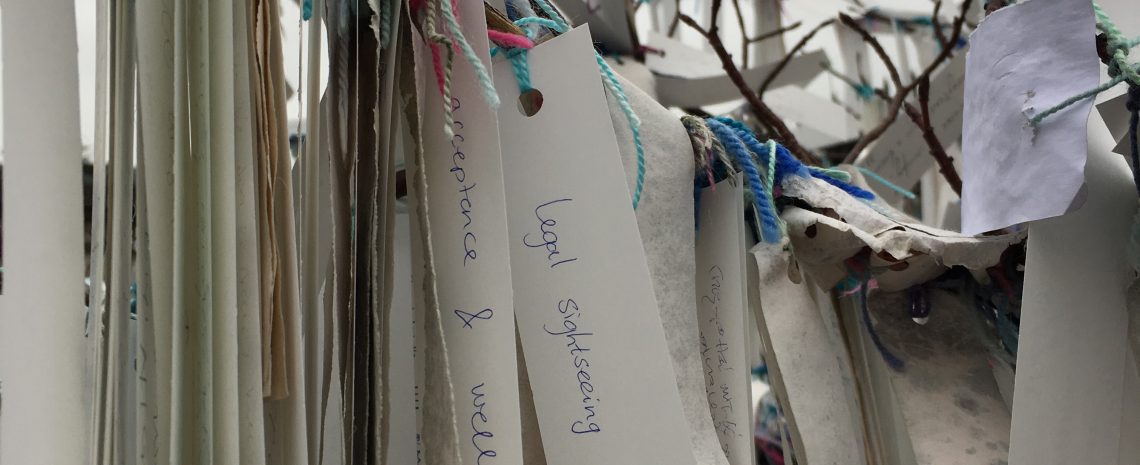EWIS Amsterdam, 12-14 July 2023
Image: Court drawing by Machteld Aardse
Workshop convenors: Tasniem Anwar, Sofia Stolk, Renske Vos
For scholars of international law and politics, there is much to learn from working with artists and designers. Art attunes us to the powerful role of the imagination and fiction to understand the international. A methodological exchange between artistic and academic research encourages us to reconsider the role of design, architecture, and materiality in the formation of world events and in building an international community. Art illuminates the material, affective and aesthetic aspects of political and legal objects and activities. At the same time, art can function as form of resistance in itself, or bring out political narratives of larger collectivities. In short, art invites to change the fabrics of scholarly analysis.
There is now a longer standing trajectory of legal and political research working with and through art. Scholars have experimented with collaging (M’charek 2014; Parfitt 2020) and bricolage (Aradau et al 2014), they have engaged with design (Austin & Leander 2021; Keshavarz & Parsa 2019) and architecture (Stolk & Vos 2020) as material manifestation of the international and as analytical lens, or have worked with art as epistemological resistance (McKittrick 2020). Inspired by these literatures, we inquire how such artistic explorations and collaborations affect our methodological tools, decisions, and possibilities.
In this workshop we want to inquire how such collaborations lead to novel insights about (non)linear paths towards data collection, data analysis, and the production of (scientific) knowledge. We aim to bring together scholars and artists who have worked with artistic methods in their research on international law and politics. We invite contributions on working with, for example, (algorithmic) design, architecture, performance art, visual art, and music. We are open to contributions across a wide range of topics and methodologies studying the intersection of art, design, international law and politics.
We will focus amongst ohters on the following questions:
1) How do researcher-artist collaborations challenge and enrich current methodological debates?
2) How do such collaborations produce novel forms of knowledge on international law & politics?
3) How do we disseminate the outcomes of research-artist collaborations?
Programme
Day 1
Session 1 and 2: Mood boards
- Performing / Staging: Keri, Barbara, Julian, Jackie, Sofia
- Sensing / Being / Ethnography: Sayra, Rachel, Tobias, Tasniem
- Curating / Collaging: Lucy, Isobel, Massimiliano, Christine, Amin, Machteld
- Narrating: Marie, Nilgün, Mahmoud, Renske
Session 3: Traveling Methods Chair: Renske Vos
- Massimiliano Masini, Aline Wani and Maevia Griffiths, Movement, Space and Violence: exploring dance as an affective method for IR
- Isobel Roele, Just Noticing: On what lawyers might see in the visual arts
- Jacqueline Hodgson and Rachel Lewis, Arts, Culture and Community Trust in Policing
Session 4: Explorations Chair: Tasniem Anwar
- Marie Beauchamps, When Creative Writing Becomes a Tool to Sustain the Vitality of Academic Research and Writing
- Nilgün Yelpaze, Bakur (North): challenging the asymmetries with strong filmic narratives
- Sayra Adinda van den Berg, The art of justice in South Sudan: an ethnographic examination of arts as unconventional and unrecognized transitional justice spaces
Day 2
Session 5: Crossing Borders Chair: Renske Vos
- Christine Unrau, Visualizing Migration and Migrating Visuals. Exploring the emotional politics of migration between academia, activism and the arts
- Amin Parsa, Mahmoud Keshavarz, Eric Snodgrass, (Re)making Law at the Border
Session 6: Anthropocene Chair: Tasniem Anwar
- Barbara Koole and Tobias Arnoldussen, ‘The Spectacle of Conflict’: how to represent conflict and law in theatrical intervention
- Andrea Leiter, A Thousand Breaths: A Thousand Breaths is an experiment in participatory legal concepting through enabling collaborations and constructing alternative funding models that empower ongoing work towards challenging breathing injustices.
- Julian Wilming, The Relationship Between Art and Academic Theory. A case study of research-based theatre processes about degrowth
Session 7: Transformation Chair: Sofia Stolk
- Miriam Bak McKenna and Jessy Hutchens, Australian Indigenous Sovereignty and Artistic Practice
- Manuela Camargo de Assis, And Other Displacements… Dialogues and frictions between international law and the visual arts
- Keri van Douwen, Scenes from the International Law Commission
Session 8: Closure Chair: Renske Vos
- Tasniem Anwar and Machteld Aardse, The Courtroom as Landscape
Participants
Tasniem Anwar, Machteld Aardse, Tobias Arnoldussen, Miriam Bak McKenna, Marie Beauchamps, Sayra Adinda van den Berg, Manuela Camargo de Assis, Keri van Douwen, Lucy Finchett Maddock, Maevia Griffiths, Jacqueline S Hodgson, Jessya Hutchens, Mahmoud Keshavarz, Barbara Pien Koole, Andrea Leiter, Rachel Lewis, Massimiliano Masini, Amin Parsa, Isobel Roele, Eric Snodgrass, Sofia Stolk, Christine Unrau, Renske Vos, Aline Wani, Julian Willming, Nilgün Yelpaze.


